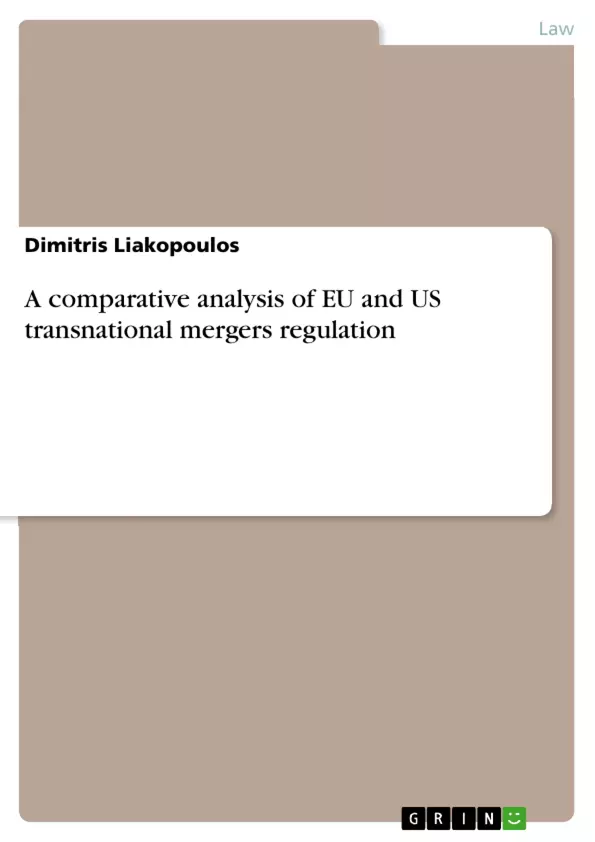The major problem associated with the regulation of transnational mergers, which affect several national markets, is the allocation of jurisdiction. Each country concerned may wish to exert jurisdiction and apply its national competition law to regulate the anti-competitive effects a merger may have in its territory. However, this approach may lead to risks of inconsistent decisions regarding the legality of mergers. Indeed, the national competition laws applied by the regulating authorities may diverge in several aspects, which raise the likelihood of inconsistency.
The authors advocates the creation of an international merger control framework (IMCF) for the regulation of transnational mergers. This framework will rest on an informal and a formal pillar. The former includes non-legally binding competition principles. Consistency of these principles with the concepts of legitimacy and efficiency, as well as the presence of peer reviews and assistance programmes, should lower the risk of non-implementation. The formal pillar includes bilateral cooperation agreements which apply to merger affecting the countries which have concluded the agreements.
As essential pre-condition for the application of bilateral agreements, the level of cooperation achieved by such agreements should be at least equal to that ensured by the informal pillar. The last part of the study addresses and examines the long and complex processes in merger and acquisition (M&A) transactions. M&A arbitration faces certain difficulties during the transaction. Such difficulties the author seeks to underline. Two main problems of arbitration in M&A transactions, particullarly, have been covered. Firstly, the problem of consent in consolidation of parallel proceedings during M&A transactions, and, secondly parties' consent that validate arbitration agreements/clauses in “assignment” or “succession” after M&A transactions have been completed. The author also tries to clarify the content of consent of parties to a transaction. Finally, a criticism of parallel proceedings is enhanced.
Inhaltsverzeichnis (Table of Contents)
- Chapter I
- Introduction
- The aim of this monograph
- The problems regarding the regulation of transnational mergers
- The structure of the book
- Chapter II
- The unilateral strategy
- Introduction
- The concept of extraterritorial jurisdiction
- The grounds of extraterritoriality
- The unilateral strategy and competition law
- The US and EC positions for extraterritorial application of competition law
- Extraterritorial application of competition law to merger cases
- The demise of the unilateral strategy
- Conclusions
- Chapter III
- A comparative analysis of EC and US merger control law: The institutional framework and procedural rules
Zielsetzung und Themenschwerpunkte (Objectives and Key Themes)
This monograph examines the regulation of transnational mergers, focusing on the challenges of jurisdiction and the need for effective international cooperation. It analyzes the historical evolution of regulatory approaches, specifically the shift from unilateral to multilateral strategies.
- The complexities of regulating transnational mergers across different national jurisdictions.
- The evolution of regulatory strategies from unilateral to multilateral approaches.
- The need for international cooperation and the challenges of achieving it.
- The potential of an international merger control framework (IMCF) as a solution.
- The role of both informal and formal pillars in the IMCF.
Zusammenfassung der Kapitel (Chapter Summaries)
Chapter I introduces the monograph's purpose and outlines the problems associated with regulating transnational mergers. It emphasizes the challenges of jurisdictional allocation and the potential for inconsistencies in merger control decisions. The chapter also provides an overview of the monograph's structure.
Chapter II delves into the unilateral strategy, examining the concept of extraterritorial jurisdiction and the grounds for its application. It explores the application of competition law in the US and EC, highlighting the limitations of the unilateral approach. The chapter concludes with the argument for a shift towards multilateral strategies.
Chapter III provides a comparative analysis of the institutional frameworks and procedural rules governing merger control in the US and EC.
Schlüsselwörter (Keywords)
Transnational mergers, competition law, extraterritorial jurisdiction, unilateral strategy, multilateral strategy, international merger control framework (IMCF), bilateral cooperation agreements, merger control law, institutional framework, procedural rules.
Frequently Asked Questions
What are the main challenges in regulating transnational mergers?
The primary problem is jurisdictional allocation, where multiple countries apply diverging national competition laws to the same merger, leading to inconsistent decisions.
What is the "unilateral strategy" in merger control?
It refers to the extraterritorial application of national competition laws by a single state to regulate mergers that occur outside its borders but affect its territory.
What is the proposed International Merger Control Framework (IMCF)?
The IMCF is a framework based on an informal pillar (non-binding principles) and a formal pillar (bilateral cooperation agreements) to harmonize global merger regulation.
How do EU and US merger control laws differ?
The monograph provides a comparative analysis of their institutional frameworks and procedural rules, highlighting areas where regulatory approaches may diverge.
What role does arbitration play in M&A transactions?
Arbitration faces difficulties in M&A, particularly regarding party consent in parallel proceedings and the validity of arbitration clauses after succession or assignment.
- Arbeit zitieren
- Dimitris Liakopoulos (Autor:in), 2017, A comparative analysis of EU and US transnational mergers regulation, München, GRIN Verlag, https://www.grin.com/document/384880



